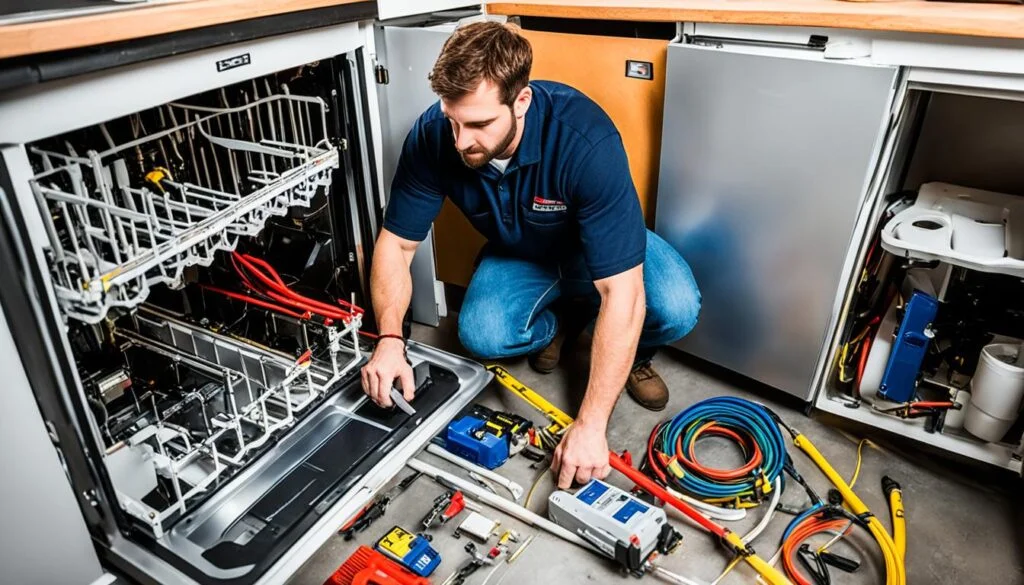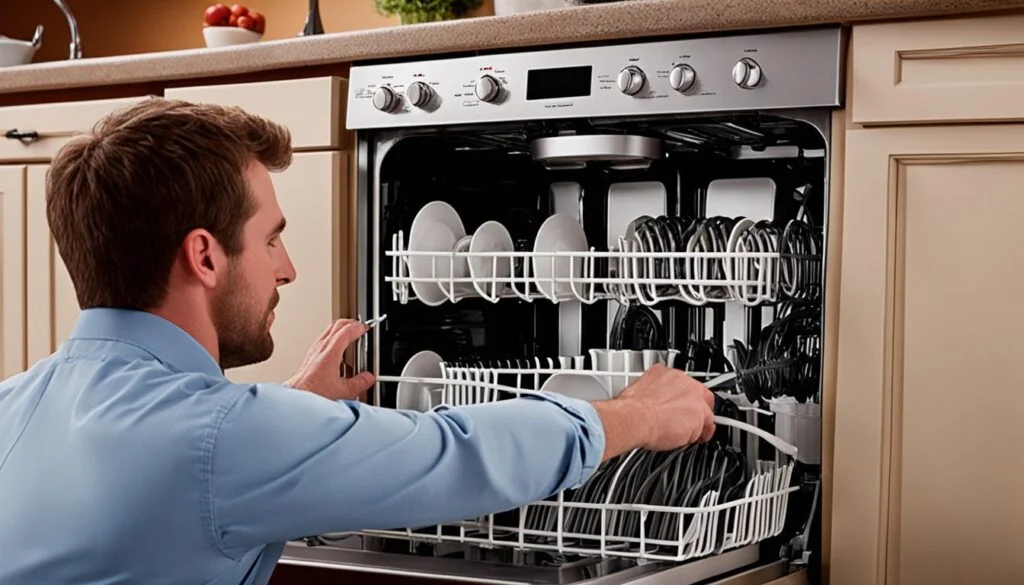When it comes to home electrical safety, there’s a constant debate about whether certain appliances, such as dishwashers, should be on Ground Fault Circuit Interrupters (GFCIs). The issue arises due to the unique characteristics of these appliances, which combine electricity and water two elements that can pose significant risks if not properly managed. In this article, we delve into the nuances of whether a dishwasher should be connected to a GFCI, providing comprehensive insights into the factors you should consider to ensure your home’s safety.
Table of Contents
Should a Dishwasher Be on GFCI?
Yes, a dishwasher should be on a GFCI (Ground Fault Circuit Interrupter) for safety reasons. GFCI outlets are designed to protect against electrical shock by cutting off power when they detect an imbalance in the electrical current. Since dishwashers use water and electricity in close proximity, having them connected to a GFCI outlet helps mitigate the risk of electrical hazards, especially in areas like kitchens and laundry rooms where moisture is prevalent.
However, it’s important to note that local building codes may vary regarding the requirement for GFCI protection for dishwashers. In some cases, it may not be mandated if the dishwasher is hardwired directly into the electrical system rather than plugged into an outlet. Always consult with a licensed electrician or refer to your local code regulations to ensure compliance and safety in your specific installation.

What is a GFCI and How Does It Work?
A Ground Fault Circuit Interrupter (GFCI) is a specialized type of circuit breaker designed to protect individuals from electric shock. It monitors the flow of electricity in a circuit and quickly shuts off power if it detects any imbalance between the incoming and outgoing current. This imbalance, often caused by a ground fault, could result in electrical shock if not addressed immediately.
GFCIs are most commonly found in areas where water and electricity are likely to come into contact, such as bathrooms, kitchens, garages, and outdoor spaces. The National Electrical Code (NEC) has established guidelines that dictate where GFCIs should be installed to maximize safety.
NEC Guidelines for GFCI Installation
The National Electrical Code (NEC) is the benchmark for electrical safety in residential and commercial buildings in the United States. The NEC is regularly updated to reflect new safety standards and technological advancements. According to the NEC, GFCIs are required in specific locations within a home:
- Bathrooms: Any outlets within 6 feet of a sink must be GFCI-protected.
- Kitchens: GFCIs are required for outlets that serve countertop surfaces.
- Garages and Basements: All outlets in garages and unfinished basements must be GFCI-protected.
- Outdoor Areas: All outdoor outlets must be GFCI-protected.
However, when it comes to appliances like dishwashers, the NEC’s guidelines are less clear. The code does not explicitly require dishwashers to be connected to a GFCI, but some interpretations suggest that they should be, especially if the dishwasher is located in a place where it could come into contact with water.
The Argument for GFCI Protection on Dishwashers
Advocates for connecting dishwashers to a GFCI argue that these appliances present a unique risk due to their combination of electricity and water. A dishwasher malfunction could lead to water leaking into electrical components, which could cause a ground fault. In such cases, a GFCI would shut off the power, potentially preventing electric shock or even a fire.

Electrical safety experts often recommend GFCI protection for dishwashers, particularly in older homes where wiring may not be up to current standards. The risk of electrical shock is heightened if the dishwasher is installed in a kitchen island or near a sink, where water exposure is more likely.
The Case Against GFCI Protection for Dishwashers
On the other hand, some electricians and homeowners argue against using GFCI protection for dishwashers. One of the main concerns is that dishwashers, particularly older models, can cause nuisance tripping of the GFCI. This happens when the GFCI incorrectly detects a ground fault and shuts off power, which can be frustrating and inconvenient, especially during a wash cycle.
Moreover, dishwashers are typically hardwired directly into the home’s electrical system, unlike other kitchen appliances that plug into an outlet. This hardwiring complicates the installation of a GFCI and may require professional assistance, leading to additional costs.
Regional Variations in GFCI Requirements
It’s also important to note that GFCI requirements for dishwashers can vary depending on your location. Some regions have adopted local codes that go beyond the NEC’s recommendations, requiring GFCI protection for dishwashers in all new constructions or renovations. Homeowners should check with local building authorities to ensure compliance with any additional regulations.
Steps to Ensure Dishwasher Safety Without a GFCI
If you decide against installing a GFCI for your dishwasher, there are other steps you can take to enhance safety:
- Regular Maintenance: Ensure that your dishwasher is regularly inspected and maintained. Check for any signs of wear, corrosion, or leaks that could pose electrical hazards.
- Proper Installation: Ensure that the dishwasher is installed correctly by a licensed electrician. Proper grounding is crucial to prevent electrical issues.
- Use a Dedicated Circuit: Consider installing your dishwasher on a dedicated circuit. This isolates it from other appliances, reducing the risk of overloading the circuit and causing electrical problems.
- Install an AFCI: An Arc Fault Circuit Interrupter (AFCI) can be used in conjunction with a GFCI to provide additional protection. While a GFCI protects against ground faults, an AFCI detects and mitigates arc faults, which can lead to fires.
Conclusion:
In conclusion, it is important for dishwashers to be on a GFCI circuit to enhance safety by preventing potential electrical shocks. As per the National Electrical Code (NEC) requirements, ensuring that your dishwasher is protected by GFCI is a crucial step in maintaining a safe kitchen environment, particularly due to the proximity of water and electrical components. If your dishwasher is not currently on a GFCI circuit, updating the wiring is a prudent decision to comply with safety standards and protect your home.

FAQs: Should a Dishwasher Be on a GFCI Circuit?
1. What is a GFCI, and why is it important for dishwashers?
- A GFCI (Ground Fault Circuit Interrupter) is a device that cuts off the electrical supply if it detects an imbalance between the hot and neutral wires, which can indicate a potential shock hazard. This is important for dishwashers as they are often near water, increasing the risk of electrical shock.
2. Is it mandatory for dishwashers to be on a GFCI circuit?
- Yes, according to the National Electrical Code (NEC), it is mandatory for dishwashers installed in residential kitchens to be on a GFCI circuit to ensure safety.
3. What happens if my dishwasher is not on a GFCI circuit?
- If your dishwasher is not on a GFCI circuit, there is a higher risk of electrical shock, especially in the presence of water. It also means your installation may not comply with current safety codes, and you should consider updating the wiring.
4. Can I install a GFCI outlet myself for my dishwasher?
- While it is possible to install a GFCI outlet yourself, it is recommended to hire a licensed electrician to ensure the installation is done correctly and safely, especially when dealing with high-power appliances like dishwashers.
5. Are older homes required to have GFCI protection for dishwashers?
- If your home was built before the NEC required GFCI protection for dishwashers, you might not have this safety feature. However, it is advisable to update your electrical system to meet current safety standards, even in older homes.
6. Will a GFCI outlet trip often with a dishwasher?
- A properly functioning dishwasher should not cause frequent tripping of a GFCI outlet. If you experience frequent tripping, it could indicate an issue with the dishwasher or the electrical circuit that should be inspected by a professional.
7. How can I tell if my dishwasher is on a GFCI circuit?
- You can check if your dishwasher is on a GFCI circuit by locating the outlet or circuit breaker it is connected to. If it’s a GFCI outlet, it will have “Test” and “Reset” buttons. If it’s on a GFCI-protected breaker, it will be labeled as such in your electrical panel.
These FAQs should help you understand the importance of GFCI protection for dishwashers and guide you on what steps to take if your dishwasher is not currently on a GFCI circuit.

